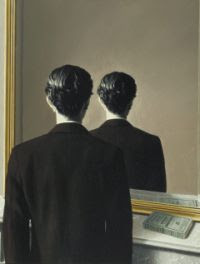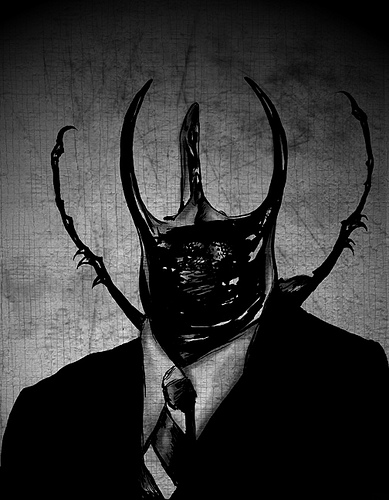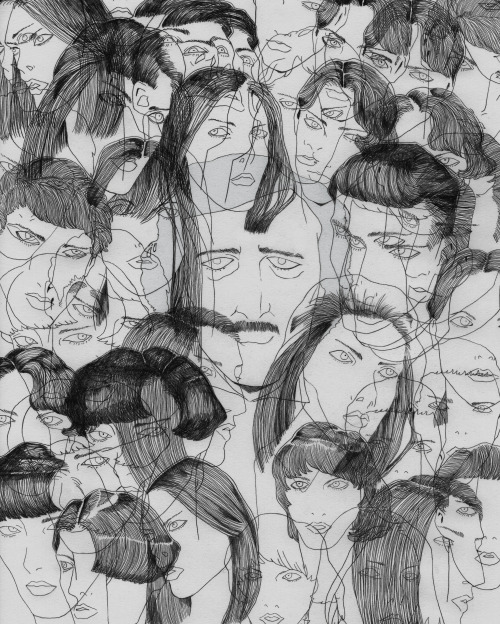
Thursday, April 28, 2016
Lot 49 (pt. II): Group 1
[Posted by JOHN and ELIZABETH]
Oedipa becomes increasingly obsessed with the image of the muted post horn as the story goes on. In her pursuit of learning more about it, both Oedipa, herself and readers are forced to decide whether or not the reoccurrence of this image is meaningful or just coincidence. In the reading of this text, are random occurrences and instances of chance intended to be found meaningful? Do you think the anticlimactic ending of the novel supports or opposes this type of meaning-seeking approach?
Lot 49 (pt. II): Group 2
[Posted by: NICOLE & RACHEL]
Through Oedipa's fascination with the plays and Metzger's job as an actor, along with her own dreams, she seems to have a desire to live in a fantasy world. And yet, despite that fascination, she still seems to want a certain amount of control over her imaginary world. How do these two desires contrast each other and how does it apply to the IA's involvement with love? When Oedipa is talking with Arnold Snarb, he explains being a member of the IA as isolates from love. Do you think Oedipa's ability to live in a fantasy world allows her to be isolate from love? Do you think she would want to be isolate?
Lot 49 (pt. II): Group 3
[Posted by JESS and JORDAN]
What passages, scenes, and/ or literary elements foreshadow that Oedipa will fall into looking into the conspiracy?
Tuesday, April 26, 2016
The Crying of Lot 49: Group 2
[Posted by LIN]
How do jobs play into the psyche of the characters? I have noticed that character's professions or former professions are often brought up. Oedipa becomes a co-executor of Pierce's company even though she'd rather not. Mucho is discontent with his job and Metzger brings up his past as an actor. Why are their professions so frequently brought up? Does it say anything about their mental state?
Monday, April 25, 2016
The Crying of Lot 49: Group 1
[Posted by ABBY and TAYLOR]
How does Pynchon use language to blur the lines between real experiences and hallucinations? Does the reader know less than Oedipa or is she just as lost? What do these objective accounts of subjective points of view suggest about the nature of reality?
The Crying of Lot 49: Group 3
[Posted by SAVANNAH and MIKAYLA]
Do you think the names in the novel have any significance? Do they provide any significant symbolic meaning for the characters and places they represent or are they simply employed by Pynchon as a means of comedic word play? You may want to consider Oedipa Maas, Mucho Maas, San Narciso, Dr. Hilarius, Mike Fallopian, Pierce Inverarity, and Metzger.
Thursday, April 14, 2016
Nadja: Group 3
Do you think that Nadja helped the narrator answer the question "Who am I"? Why or why not? If you answered yes, how do Nadja's drawings assist him in this discovery?
Nadja: Group 2
Why is Breton so fascinated with Nadja, and how is this different from the way that others perceive her? Does her insanity affect her negatively or does it provide new insight and a different perspective on life?
Wednesday, April 13, 2016
Nadja: Group 1
In class we discussed briefly about the obscure images that appear often throughout the book, "Nadja". My question is whether you felt the pictures either aided you in understanding the context of the story, or did it just cause you more confusion?
Thursday, March 31, 2016
Metamorphosis: Group 3
Posted by Natalie
When Gregor is in his insect form, about what size do you believe he is? Is Gregor small enough to hide himself under the sofa or behind the door without being seen, or is he so large that he needs to cover himself with a sheet? Does the insect Gregor maintain one size throughout the book or does his size seem to differ depending on his situation? What does the size of Gregor's insect body say about who he is as a person? Is Gregor's size a reflection of his opinion of himslef or is it a reflection of how others see him?
Wednesday, March 30, 2016
Metamorphosis: Group 2
[Posted by KATE]
Could we consider Gregor to be insane? Why or why not? Does his attitude of normalcy towards his condition when he wakes up at the beginning of the story reveal anything about his mental state?
Tuesday, March 29, 2016
Metamorphosis: Group 1
Posted by LEANNE
How, and in what ways can we use Freud's ideas on family romances/drama to read The Metamorphosis? Does the story assert or challenge these ideas, and where might we see examples of this?
What do you make of the ending?
Thursday, March 3, 2016
Gustl: Group 3
 |
| Egon Schiele, Portrait of Anton Peschka, 1909 |
Aristotle suggested that proper tragedy should always
move toward the moment of self-reflection/self-recognition (anagnorisis) that transforms the tragic hero’s consciousness. Does such a moment arrive for Gustl? Why or why not? Is Lt. Gustl a tragedy or a comedy?
Gustl: Group 2
Egon Schiele, Self-Portrait with Physalis, 1912
In what ways might we see Lt. Gust as an exploration of
the psychological mechanism of repression? What sort of things does Gustl deny, disavow or
otherwise repress? Why is this significant?
Gustl: Group 1
Egon Schiele, Portrait of an Officer, 1916
What does the narrative strategy of interior monologue/stream-of-consciousness achieve in terms of rendering the character of Lt.
Gustl? Why do you think this might be
important to what you perceive as Schnitzler’s larger aims?
Monday, February 8, 2016
The Double: Group 1
The Double: Group 2
The Double: Group 3
 |
| Rene Magritte, Not to Be Reproduced |
We have noted that The Double can be read productively in light of Freud's theory of the uncanny. We have also discussed the ways in which the text can be understood as more than just a "descent into madness" narrative, that is, as an exploration of the relationship between the individual and the social body and as a social critique of imperial Russian culture in particular. How do these two strains relate? Is it possible to argue that the insights embedded in Dostoevsky's text can only be accessed through the uncanny?
Friday, January 29, 2016
Poe: "The Man of the Crowd"
We have discussed the relationship between the literary gothic (or "uncanny") and narratives in which the narrator and/or protagonist is clearly suffering from psychological disturbance. Dickinson's poems, Gogol's "Diary of a Madman" and Poe's "The Tell-Tale Heart" all work quite well as illustrations of this interrelationship. But what about a text such as "The Man of the Crowd," in which neither madness nor gothic/supernatural elements are immediately evident? Can you identify any aspects of this odd story that you would associate with "madness" in some form? If it is difficult to label this text as "gothic," is there anything that might correspond to how Freud defines the "uncanny"? (note: you do not need to answer both of these questions).
Sunday, January 17, 2016
Subscribe to:
Posts (Atom)

















.jpg)